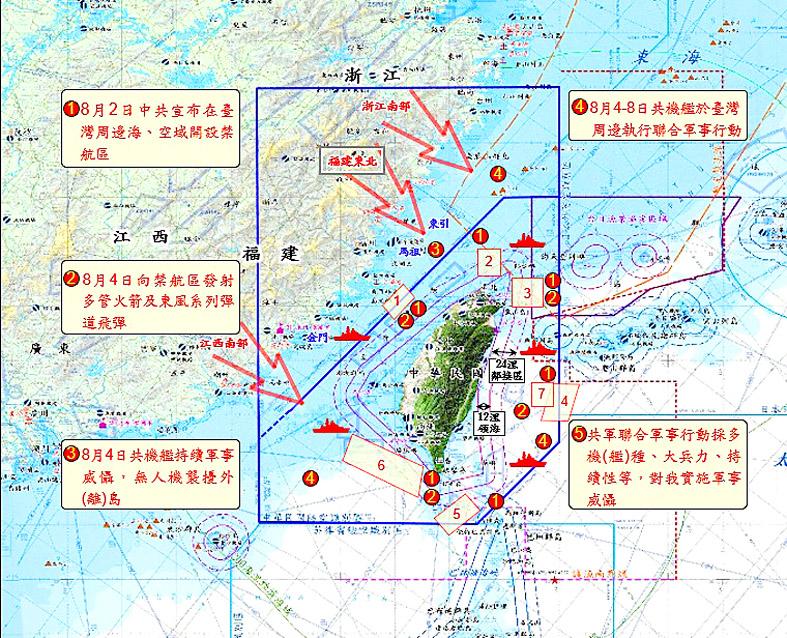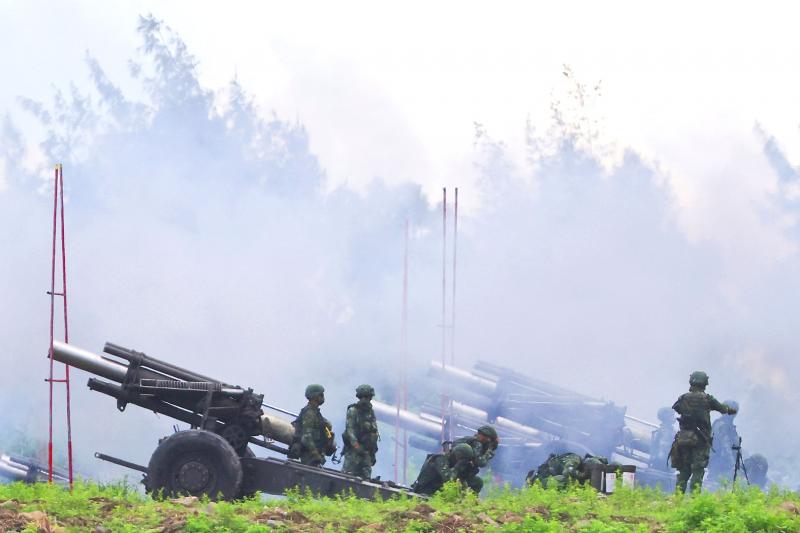Taiwan’s military leaders have launched a behind-the-scenes push for a NT$400 billion (US$13.34 billion) defense budget next year due to China’s increased military intimidation, a high-ranking official said yesterday.
Speaking on condition of anonymity, the official said that lawmakers had trimmed this year’s military budget from a proposed NT$372.6 billion to NT$367.6 billion before a surge in Chinese activity drove up the military’s operational costs.
Defense spending on fuel, maintenance and replacement parts has skyrocketed due to the numerous missions to intercept Chinese People’s Liberation Army (PLA) aircraft and ships, they said, adding that reserve funds have been activated multiple times this year.

Photo courtesy of the Ministry of National Defense
Last month, the Executive Yuan indicated its intent to boost the defense budget — which averaged 3 precent of GDP over the past five years — to 4.09 percent next year, which would add more than NT$15 billion to national defense, the official said.
Military leaders deem even this sum to be inadequate to meet the country’s need to augment its forces, as China’s drills now constitute a direct threat to national security, the source said.
The leaders believe that Taiwan should adopt emergency combat preparedness measures, a term encompassing accelerated arms procurement and other actions, the official said.

Photo: Ann Wang, Reuters
In 1996, then-president Lee Teng-hui (李登輝) ordered the implementation of the measures in response to the Third Taiwan Strait Crisis, they said.
The measures included medium-range surface-to-air missiles being converted into short-range surface-to-surface missiles and then rapidly deployed, and lease-then-buy deals for US-made electronic equipment and arms, they said.
Proponents of the combat preparedness measures believe the government must raise at least NT$400 billion for the military to implement them today with reasonable confidence of success, the official said.
The Ministry of National Defense is to submit its assessment of the China threat and the military’s current and future needs to the legislature with the Cabinet’s general budget proposal.

The Ministry of Economic Affairs has fined Taobao NT$1.2 million (US$36,912) for advertisements that exceed its approved business scope, requiring the Chinese e-commerce platform to make corrections in the first half of this year or its license may be revoked. Lawmakers have called for stricter enforcement of Chinese e-commerce platforms and measures to prevent China from laundering its goods through Taiwan in response to US President Donald Trump’s heavy tariffs on China. The Legislative Yuan’s Finance Committee met today to discuss policies to prevent China from dumping goods in Taiwan, inviting government agencies to report. Democratic Progressive Party Legislator Kuo Kuo-wen (郭國文) said

The Ministry of Economic Affairs has fined Taobao NT$1.2 million (US$36,900) for advertisements that exceeded its approved business scope and ordered the Chinese e-commerce platform to make corrections in the first half of this year or its license would be revoked. Lawmakers have called for stricter supervision of Chinese e-commerce platforms and more stringent measures to prevent China from laundering its goods through Taiwan as US President Donald Trump’s administration cracks down on origin laundering. The legislature’s Finance Committee yesterday met to discuss policies to prevent China from dumping goods in Taiwan, inviting government agencies to report on the matter. Democratic Progressive Party

Taiwan and its Pacific ally Tuvalu on Tuesday signed two accords aimed at facilitating bilateral cooperation on labor affairs, according to Taiwan’s Ministry of Foreign Affairs (MOFA). The governments inked two agreements in Taipei, witnessed by Foreign Minister Lin Chia-lung (林佳龍) and visiting Deputy Tuvaluan Prime Minister Panapasi Nelesone, MOFA said in a news release. According to MOFA, the agreements will facilitate cooperation on labor issues and allow the two sides to mutually recognize seafarers’ certificates and related training. Taiwan would also continue to collaborate with Tuvalu across various fields to promote economic prosperity as well as the well-being of their

Sung Chien-liang (宋建樑), who led efforts to recall Democratic Progressive Party (DPP) Legislator Lee Kun-cheng (李坤城), was released on bail of NT$80,000 today amid outcry over his decision to wear a Nazi armband to questioning the night before. Sung arrived at the New Taipei District Prosecutors’ Office for questioning in a recall petition forgery case last night wearing a red armband bearing a swastika, carrying a copy of Adolf Hitler’s Mein Kampf and giving a Nazi salute. Sung left the building at 1:15am without the armband and covering the book with his coat. Lee said today that this is a serious